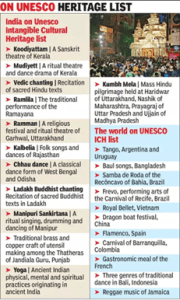TAG: GS-1: HISTORY
THE CONTEXT: Recently the United Nations Educational, Scientific and Cultural Organization (UNESCO) recognized the Karnataka Janapada Parishad for its work in safeguarding intangible cultural heritage.
EXPLANATION:
What are the Key Facts About Janapada Parishath?
- The Karnataka Janapada Parishath is an organization established to promote and preserve the folk arts, music, dance, and traditions of Karnataka, collectively referred to as Janapada.
- It is Established in 1979 by H.L. Nage Gowda, a dedicated cultural activist.
- The parishath has played a crucial role in documenting and promoting various folk traditions of the state, which are integral to its cultural identity.
- The organization was initially known as the Karnataka Janapada Parishath but later dropped the “Karnataka” prefix to focus on a wider scope of folk-art preservation.
Importance of Folk Culture in Karnataka:
- Diverse Folk Traditions: Karnataka has a rich array of folk arts, including Yakshagana, Dollu Kunitha, Veeragase, Puppetry, and various forms of rural folklore. These art forms are not only a source of entertainment but also serve as mediums for storytelling, history, and social commentary.
- Cultural Preservation: The Karnataka Janapada Parishath has been instrumental in the documentation, research, and dissemination of these traditions, ensuring that they are passed on to future generations.
- Empowering Local Communities: By promoting folk traditions, the Parishath supports local communities that are custodians of these art forms, offering them platforms for performances and cultural exchange.
About UNESCO?
- The United Nations Educational, Scientific and Cultural Organization (UNESCO) is a specialised agency of the United Nations (UN) aimed at promoting world peace and security through international cooperation in education, arts, sciences, and culture
- UNESCO was founded in 1945 as the successor to the League of Nations’ International Committee on Intellectual Cooperation
- It has 193 member states and 11 associate members, as well as partners in the non-governmental, intergovernmental, and private sector
- Headquartered at the World Heritage Centre in Paris
- The UNESCO’s founding mission is to advance peace, sustainable development and human rights by facilitating collaboration and dialogue among nations
- It pursues this objective through five major program areas Education, Natural sciences Social/Human sciences, Culture and Communication/information
- UNESCO is governed by the General Conference, composed of member states and associate members, which meets biannually to set the agency’s programmes and the budget.
- It also elects members of the Executive Board, which manages UNESCO’s work, and appoints every four years a Director-General, who serves as UNESCO’s chief administrator
UNESCO World Heritage Sites in India:

SOURCE:
Spread the Word
